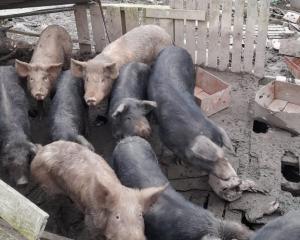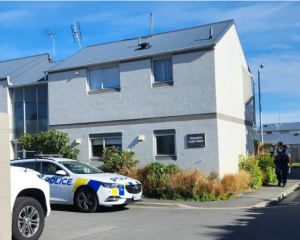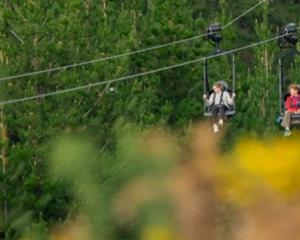
If everything was going to plan, the organisers behind Bay Dreams would have announced the world’s biggest rapper — Kendrick Lamar — to headline their January music festival, set to be held in Tauranga and Queenstown.
But things have not gone to plan for Mitch Lowe and Toby Burrows, two Tauranga-based promoters who have confirmed Bay Dreams, once the country’s biggest music festival, will not go ahead in 2025.
It is, they say, a "bittersweet" announcement forced by changing festival conditions, including rising costs, struggles to attract international headline talent, changing expectations from festival-goers and the ongoing cost-of-living crisis making ticket sales a struggle.
"We wanted to only deliver Bay Dreams at the highest level with the biggest artists," Mr Burrows said.
"If we couldn’t deliver that we’d rather not do it this year, rather than come in with an undercooked one and destroy the brand."
Beginning in 2016, Bay Dreams grew quickly, attracting tens of thousands of fans to Mt Maunganui to see acts like Cardi B, Diplo and Tyler, the Creator headline bass-heavy lineups across multiple stages.
By 2019, the festival was so popular it expanded to a second site in Nelson, which moved to Queenstown for 2024. At its peak, more than 50,000 people attended the two early-January events, making it the biggest festival held in New Zealand at the time.
It becomes the latest in a growing list of festivals not returning next year. After suffering sluggish ticket sales, Splore is taking 2025 off. Hawke’s Bay’s Nest Fest is in receivership after its 2024 event, and Morningside Block Party was called off in March and seems unlikely to return.
In recent months, events headlined by XZibit, Public Enemy and Tenacious D have been cancelled.
The pair call 2025 a "hiatus".
"It’s not the end of it," Mr Burrows said.
"We didn’t want to deliver a sub-par Bay Dreams."
But he predicts more festival promoters will make the same call they’ve just made.
"I think there’s going to be a lot that fall off after this summer ... It’s hard to sell tickets at the moment."
Mr Lowe and Mr Burrows say they spent months trying to book Lamar across the first half of 2024. But, by May, the Compton rapper had released his biggest song — the streaming hit Not Like Us — during an explosive feud with Drake, eventually won by Lamar.
As Lamar’s stock kept rising, the costs to bring him here went up.
"His stats doubled," Mr Lowe said.
"It’s not stuff you see every day."
Agents for artists know how to capitalise on that momentum.
"All of a sudden the fees double and it’s not attainable for you because it’s never going to work."
Mr Burrows said that was one of the many reasons making a large, multi-stage festival operation more difficult.
"The talent’s so much more expensive nowadays," he says.
"To get the big artists you’re having to pay really big money. Headliners that were $300,000 to $350,000 are now wanting $1 million-plus. Then you’re putting all your eggs in one basket ... and they may not cut through."
When Lamar proved too difficult, the pair tried to reel in other potential headliners for Bay Dreams.

"We doubled down to try and make it happen."
This, they said, was a trap festival promoters fall into.
"To get the big artists ... you’re having to pay really big money," Mr Burrows said. "That puts you in a space where you’re gonna have to sell 25,000-30,000 tickets to break even."
Mr Lowe called that "calculated gambling".
"You get really good at it, but at the end of the day there are some factors totally out of your control ... there’s a lot of risk involved."
By June, the pair said the risks were too high and they decided it was time to do something differently.
"We made a decision to let it be driven by securing the right talent," Mr Burrows said.
"If that didn’t happen, we’d take a break."
Mr Lowe: "It wasn’t going to work out, and we had to pass."
In March, UK electronic artist Fred again.. sold out shows around New Zealand — including two at Spark Arena — by announcing dates and selling tickets with just a few days’ notice.
That, Mr Lowe said, proved to him that ticket-buyers were keen to see different event models, ones headlined by artists with cult followings.
"I call it ‘the Fred again.. effect’," he said.
"He came out and showed us what’s possible if you put every fan into one room and everyone feels part of something."
So, instead of Bay Dreams, the pair have pivoted. They are bringing Australian dance star Fisher here to play two shows in Hagley Park and Victoria Park in January that will operate on a similar model to Fred again.. — one big headliner attracting all the same fans.
"I believe right now and for the foreseeable future, there are some superstars shining through. Generally, those are the shows that are doing really well ... all of the same type of people in the same area who love it."
On his own, Fisher has nearly sold as many tickets as Bay Dreams at its peak.
"I think it’s going to be the most successful show of the summer," Mr Lowe said.
He believes it was the right business decision.
"If we put [Fisher’s] name under a festival product, it would have sold half of the tickets it has ... It could not have been a better decision for us."
They are not giving up on festivals and still have several in play this summer, including the drum ’n bass New Year’s event Famous Last Words in Tauranga, the indie festival Le Currents in Taupo, and Mystery Festival, an Auckland-based dance event in November whose headliners will not be revealed until the day of the show.
For now, as long as costs stay as high as they are, they predict large-scale, multi-stage festivals will be a tough market to operate in.
"I believe everything is a cycle," Mr Lowe said.
The decision to cancel next year’s event should, he hopes, make their business more sustainable.
"Luckily for us we took action before it was too late."
• Chris Schulz is a freelance entertainment writer.












